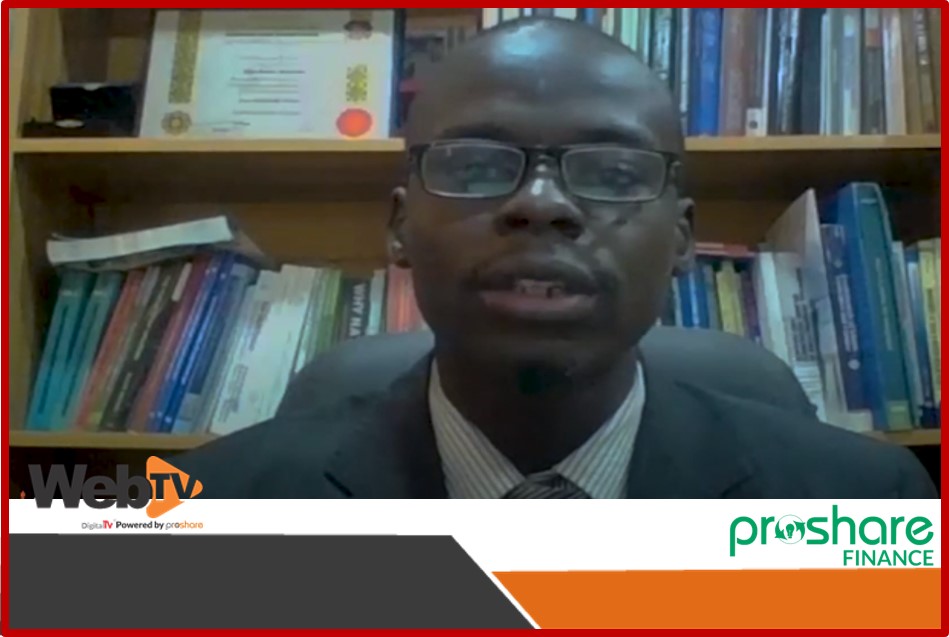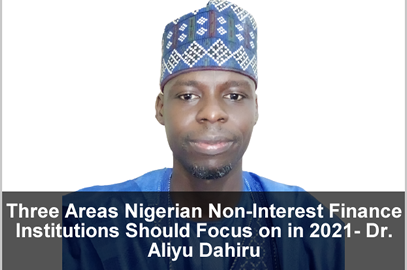Friday, January 01, 2021/ 1:00 PM / Bukola Akinyele-Yisau forWebTV / Header Image Credit: WebTVNG
The Islamic finance market had a soberyear in 2020. Despite the challenges occasioned by the novel coronaviruspandemic, non-interest banking activities stepped up modestly during the yearwith a variety of instruments providing fit-for-purpose solutions to businessneeds. Islamic scholars and financial market analysts have expressed the needfor the government to prompt stronger growth stimulus and development.
Dr Aliyu Dahiru Muhammad, Senior Lecturer at the Department ofEconomics and Deputy Director (Training and Linkages) at the InternationalInstitute of Islamic Banking and Finance, Bayero University, recently provided some perspective on the year 2020 and his 2021 outlook forthe Islamic finance market.
Muhammad noted that the year 2020 camewith a lot of challenges that affected key sectors of the economyincluding non-interest banking. He said that Q1, 2020 saw theunprecedented COVID-19 pandemic hit global markets which led to the closure ofbusinesses and borders in places like Nigeria.
He said the effect of COVID 19 on Islamicfinance was comparable to that of the conventional finance segment of theeconomy. In essence he noted that the pandemic affected the operations of thefinancial institutions (which applied to non-interest banking).
The scholar added that the governmentinterventions for which the non-interest finance institutions benefitted fromhelped in supporting a steady pathway to reviving and protecting the economy.
Sharing his perspective on the Islamic Development Bank (IsDB) response measures and support for OIC Member Countries affected by COVID-19. he said, the IsDB initiative was anchored on 3Rs which covered; respond, restore and restart. This involved thefollowing:
- Respond: In this area he highlighted the factthat it deliveredimmediate action through the South-South and North-South axis with reverselinkage operations focused on a) strengthening health systems to provide careto the infected; b) building capacity in production of testing kits andvaccines; and c) building Pandemic Preparedness capacity, in cooperation withG20 Global Initiative.
- Restore: On the concept of 'Restore' he notedthat it was meant for amedium-term action through financing for trade and SMEs to sustain activity incore strategic value chains, and to ensure continuity of the necessary suppliesmainly to the health and food sectors, and for other essential commodities.
- Restart: This according to Muhammad delivered long-term action to build resilient economies on solidfoundations and catalyze private investments by supporting economic recoveryand countercyclical spending.
He lauded the efforts of the Islamic Development Bank (IsDB) across OIC states. Dr. Muhammad urged the IsDB to work with stakeholders andgovernments to align nationalpolicies which is in line with shariah expectations.
Muhammad speaking on the most significant activities that occurred in the Nigerian non-interestfinance market in 2020,identified the signing of the BOFIA Act 2020 by President Muhammadu Buhari as apositive development.
He said by signing the BOFIA ACT 2020 intolaw Islamic Finance has come to stay in Nigeria and will help to deepen financialinclusion for people who were excluded. He was optimistic that it wouldlead to more activities in the non-interest finance space.
The Deputy Director Training andLinkages of the International Institute of Islamic Bankingand Finance, Bayero University, Kano looked at the challengesfacing the growth of Islamic finance in Nigeria, noting the need for increasedsensitizationand awareness to improve upon the 2020 performancein 2021.
He said, in terms of awareness andcapacity building the IIIBF engaged the CBN through a collaboration with theInternational Centre for Islamic Culture Education, Abuja (ICICE)conducting two trainings which is mainly for regulators where half of the participantswere Muslims and the others non-Muslims.
The Islamic finance scholar projected thatthe creation of more awareness and trainings will continue in 2021 and beyondfor people to achieve better understanding and explore the opportunities in thealternative finance market.
On key developments that would shape the non-interest financeindustry in 2021, he noted that amidst the COVID-19 pandemic,the 3rd Sukuk Issuance was oversubscribed by 400% showing that investorswere interested in the instrument.
"More companies are being established forequity financing, equity management using shariah compliant facilities and alsowe are seeing a lot of developments in Islamic finance globally" he said.
Dr Muhammad shared his thoughts on theCOVID-19second wave and its implicationsfor the non-interest finance industry, he said Nigeria was more prepared for the second wave than the firstas the government had developed mechanisms that could ensure businesses couldcontinue operations without shutting down.
Three Areas Islamic Finance InstitutionsIn Nigeria Should Look Into In 2021
On the top threeareas Islamic Finance Institutions in Nigeria should focus on in 2021, heidentified the Micro Small and Medium Enterprises, MSMEs that are shariahcompliant as one key area for ethical investors to give top consideration.
He was of the view that MSMEs were adverselyaffected by the COVID 19 experience and based on this the Islamic FinanceInstitutions needs to explore the equity mode more than Debt Financing.
Supporting Households And Businesses
According to him, the Islamic finance institutions in Nigeria need to institutionalize the Zakatas a tool for supporting the households and businesses to stabilize.
Paying Attention to Security
The ongoing security issues in the nation due tolack of jobs and opportunities remains a major concern and menace in Nigeria. Muhammad called on Islamic finance institutionsto collaborate with the governmentand reach out to more people on job opportunities. He concluded that withoutsecurity no business couldoperate efficiently.
Related Video
Related News
1. Dr. Aliyu Dahiruto Speak on Islamic Finance in Nigeria: 2020 Review And 2021 Outlook
2. 2020 Islamic Finance Outlook; MostLikely Strong Growth in Infrastructure - Dr. Aliyu Dahiru
3. Islamic Financing as a Tool forDevelopmental Financing - Dr. Aliyu Dahiru Muhammad
4. Sukuk Bonds Can Address theInfrastructure and Housing Deficits In Nigeria - Dr Aliyu Dahiru
5. #Coronanomics: Understanding AVirus from An Islamic Economic Perspective - Dr. Aliyu Muhammad
6. Zakat Distribution as A StabilizerDuring COVID-19 Pandemic
7. COVID-19: How Islamic FinanceSupports the Economy Through Waqf Crowd Funding - Dr. Aliyu Dahiru
8. NSE CEO HighlightsOpportunities For Islamic Finance And Banking In Nigeria
9. Experts Look at RepositioningNigeria As Africa's Leading Hub for Islamic Finance
10. Nigeria Among Top15 Most Advanced Islamic Finance Markets Globally
11. Why Non-InterestFinance Institutions Should Support The Growth Of Start-Ups In Nigeria - Dr.Malik
12. United Capital Launches Sukuk FundTo Deepen Non-Interest Finance In Nigeria
 Lagos, NG • GMT +1
Lagos, NG • GMT +1











 3573 views
3573 views











 Sponsored Ad
Sponsored Ad
 Advertise with Us
Advertise with Us









